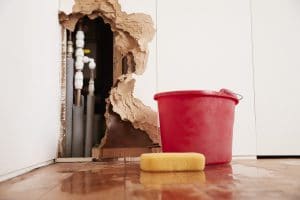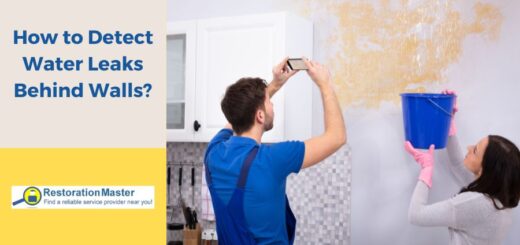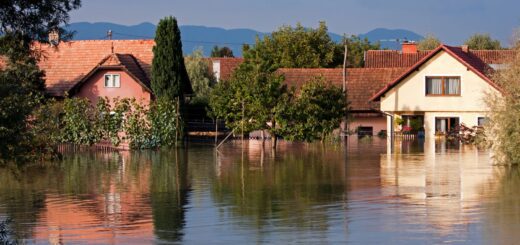How Does Homeowner’s Insurance Cover Water Damage?
Your home can suffer property damage in a myriad of ways. However, there is a good chance that damage that occurs in your home will be the result of water. This is because water damage is one of the most common forms of property damage. From natural floodingFlooding is the overflow or accumulation of water in areas t... More, and other weather-related events, to pipe leaks and other internal issues, water damage can be sourced in so many ways.
No matter what has caused the water damage, it is important to get help for it right away. Water damage is quick to spread and worsen, because porousPorous describes a material that contains small openings or ... More building materials and furnishings absorb the excess water and moisture and allow it to spread throughout the property.
To cover the damage, homeowners will often look to file an insurance claim. In fact, water damage claims are among the most common insurance claims. However, it’s important to know that water damage will not always be covered by your homeowner’s insurance.
Continue reading to learn more about how homeowner’s insurance covers water damage.
When Is Water Damage Covered by Homeowner’s Insurance?
Whether your home insurance policy covers water damage depends on various factors:
- Your policy
- The source of the damage
- The circumstance of the damage: accidental, sudden, or gradual.
Always take a look at your insurance policy and analyze the wording to see what sorts of damage it will cover. Generally, homeowner’s insuranceHomeowner’s insurance is a policy that provides financial ... More policies will cover water damage if it happens accidentally or suddenly.
Within the policy, the damage can be covered by either dwelling coverage or personal property coverage. Dwelling coverage takes care of any structural damage to your home, and personal property coverage addresses your damaged personal belongings. But such coverage is covered only if the damage occurred as a result of a covered hazard.
When Is Water Damage Not Covered by Homeowner’s Insurance?
The Water Damage’s Source
Your homeowner’s insurance policy may cover the expenses for building materials and other belongings that were damaged by water. However, it does not cover the source of the water.
For example, a pipe suddenly bursts in your home despite it having proper insulationInsulation is a material used in buildings to reduce the tra... More. As a result, it damages drywall and other building materials. Your homeowner’s insurance will cover the damage it caused to the building materials, but the cost of repairing or replacing the pipe will come out of your own pocket.
Gradual Damage and Lack of MaintenanceMaintenance is the routine care, inspection, and repair of a... More
Most homeowner’s insurances do not usually cover gradual damage. If this type of damage occurs, and you file a claim for it, then it will likely be denied.
Gradual damage is harm that occurs over time, hence the descriptor. You may claim water damage occurred suddenly or accidentally, but this kind of damage needs to be filed right away. Otherwise, time will pass, worsening the damage and re-categorizing it as gradual damage. Because of this, your insurance will not cover this damage. Some examples of gradual damage include water damage from a pipe that has been leaking over time and water damage that occurred due to a failure to repairRepair is the act of fixing or restoring damaged property, m... More damaged roofing.
Furthermore, gradual damage can be a result of poor, or even no maintenanceMaintenance is the routine care, inspection, and repair of a... More. While wear and tear is normal, proper maintenanceMaintenance is the routine care, inspection, and repair of a... More can prolong the lives and efficiency of items, which is why it’s important to have regular maintenanceMaintenance is the routine care, inspection, and repair of a... More work done. However, if you failed to maintain items, and issues arise, your insurance company won’t cover the damage.
For example, if your home has a leaky pipe, but you choose to not have it fixed right away, then it is likely it will eventually result in some amount of water damage, and possibly moldMold is a type of fungus that grows in damp or humid conditi... More growth. An insurance claim for this harm would be denied because the damage could have been prevented with proper maintenanceMaintenance is the routine care, inspection, and repair of a... More.
FloodingFlooding is the overflow or accumulation of water in areas t... More and Water Backups
Standard homeowner’s insurance does not provide coverage for any floodingFlooding is the overflow or accumulation of water in areas t... More — even if it happened because of a storm or other weather-related event. In order for your insurance company to cover floodingFlooding is the overflow or accumulation of water in areas t... More, you will need to buy an additional policy. The same usually goes for water backups caused by outside drains and sewers. If your insurance policy doesn’t cover such a situation, then you will need extra coverage.
Getting Water Damage RestorationWater damage restoration is the professional process of clea... More Help for Your Home
By knowing how your homeowner’s insurance will cover any need for water damage removal or remediation, you have a greater chance of filing a successful claim, if you do so quickly. Taking immediate action is how you should react to water damage, regardless of insurance claims.
Once water makes its way into your home, it will spread quickly, becoming absorbed by any porousPorous describes a material that contains small openings or ... More building materials and furnishings. The water will weaken the items, eventually causing serious structural damage. If the water involved in the damage is not clean, meaning it’s gray or black water, then it can result in even more damage.
Because of this, water damage is an emergency that requires prompt help. Reach out to a professional water damage restoration service to handle the repairs and restorationRestoration is the process of returning a property to its pr... More work. Professionals will have the proper equipment and expertise to conduct efficient cleaning and repairs, restoring your home to safe living conditions.














